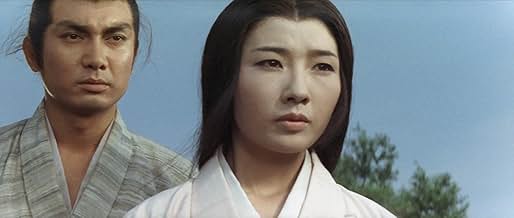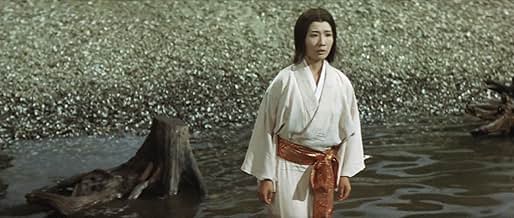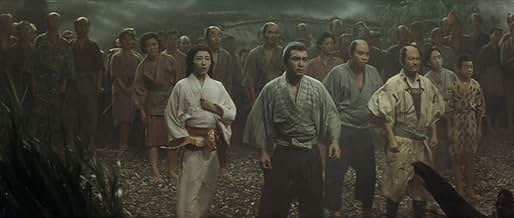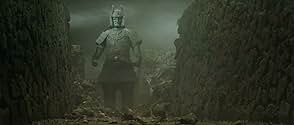PUNTUACIÓN EN IMDb
6,4/10
1,1 mil
TU PUNTUACIÓN
Añade un argumento en tu idiomaGiant statue exacts revenge upon those who conquer its worshippers.Giant statue exacts revenge upon those who conquer its worshippers.Giant statue exacts revenge upon those who conquer its worshippers.
Jutarô Kitashiro
- Genba Onikojima
- (as Jutarô Hôjô)
Reseñas destacadas
Return of Daimajin is the second film in the trilogy about the great demon god that combines elements of period dramas and giant monster movies. In this shortest movie of the series, an evil lord menaces, destroys and conquers two neighbouring villages when farmers seek refuge from him in these peaceful places. The survivors of the invasion retreat to an island on a lake where Daimajin's statue is hidden in a cave. As the lord destroys the statue, the demon god comes to life to save the villagers from the murderous dictator.
This movie convinces on numerous levels and has aged very well. First and foremost, this film clocks in at only seventy-nine minutes and entertains from start to finish with swift pace.
Up next, the locations have been chosen particularly well and bring ancestral Japan back to life. The scenic mountains and fields, the colourful villages and fortifications as well as the mysterious island on the lake are quite memorable.
The characters are also very intriguing. The antagonist is particularly brutal, pitiless and selfish and will make viewers root against him. The protagonists shine with courage, perseverance and resilience and will make viewers empathize with them. Even the side characters have interesting emotional characteristics to offer. Needless to say that the skilled acting performances match the wonderful script.
The final twenty minutes of the movie are particularly spectacular. The titular monster goes on an impressive rampage as the simple yet efficient special effects shine brightly in this movie. The architecture of the villages, the armour of the monster and the costumes of the villagers have all been crafted with great detail. The destruction of infrastructures looks impressive and has been prepared very skillfully and filmed very precisely.
The technical aspects of this movie are very strong in general. Even decades later, the calm, organized and precise camera work stands out very positively if compared to numerous action movies with dizzying shaky camera sections. The authentic, detailed and intense sound effects in the destructive finale will send shivers down the spine of any cineast. The excellent classical music soundtrack by skilled veteran Ifukube Akira is another noteworthy highlight and makes an intense movie even more emotional.
As you can read, Return of Daimajin is even a slight improvement over its critically acclaimed genre-breaking predecessor Daimajin. This sophomore entry is even more detailed, organized and precise as it turns out being a great example of how to make a timeless movie with a limited budget but much professionalism. The two movies aren't directly related to each other, so you could watch Return of Daimajin as a standalone feature. Anyone who likes period dramas and monster movies should call a copy of this movie her, his or their own. I would suggest picking up the wonderful boxed set by Arrow Media with all three films and plenty of interesting bonus material.
This movie convinces on numerous levels and has aged very well. First and foremost, this film clocks in at only seventy-nine minutes and entertains from start to finish with swift pace.
Up next, the locations have been chosen particularly well and bring ancestral Japan back to life. The scenic mountains and fields, the colourful villages and fortifications as well as the mysterious island on the lake are quite memorable.
The characters are also very intriguing. The antagonist is particularly brutal, pitiless and selfish and will make viewers root against him. The protagonists shine with courage, perseverance and resilience and will make viewers empathize with them. Even the side characters have interesting emotional characteristics to offer. Needless to say that the skilled acting performances match the wonderful script.
The final twenty minutes of the movie are particularly spectacular. The titular monster goes on an impressive rampage as the simple yet efficient special effects shine brightly in this movie. The architecture of the villages, the armour of the monster and the costumes of the villagers have all been crafted with great detail. The destruction of infrastructures looks impressive and has been prepared very skillfully and filmed very precisely.
The technical aspects of this movie are very strong in general. Even decades later, the calm, organized and precise camera work stands out very positively if compared to numerous action movies with dizzying shaky camera sections. The authentic, detailed and intense sound effects in the destructive finale will send shivers down the spine of any cineast. The excellent classical music soundtrack by skilled veteran Ifukube Akira is another noteworthy highlight and makes an intense movie even more emotional.
As you can read, Return of Daimajin is even a slight improvement over its critically acclaimed genre-breaking predecessor Daimajin. This sophomore entry is even more detailed, organized and precise as it turns out being a great example of how to make a timeless movie with a limited budget but much professionalism. The two movies aren't directly related to each other, so you could watch Return of Daimajin as a standalone feature. Anyone who likes period dramas and monster movies should call a copy of this movie her, his or their own. I would suggest picking up the wonderful boxed set by Arrow Media with all three films and plenty of interesting bonus material.
Return of Daimajin (1966) is a Japanese gem I recently watched on a random streaming service. The storyline follows a small town that is getting conquered by an evil dictators army. A young lady escapes and flees to a sacred temple and prays to their god to come save them. When the young lady is captured and made an example of the village god returns one last time to save the village.
This movie is directed by Kenji Misumi (Shogun Assassin) and stars Kôjirô Hongô (Satan's Sword), Shiho Fujimura (Zatoichi's Cane Sword), Tarô Marui (Fangs of Vengeance), Takashi Kanda (The Devil's Ballad) and Kôji Fujiyama (Bullet Train).
These are all a nice mix of samurai genre and monster movie, even if the monster doesn't appear until there's about 25 minutes left in the movie. The action scenes are very well choreographed and take place in some fun settings. I always love a good samurai sword fight scene. The effects on the monster is essentially a costume, mask and makeup but it works. The attack on the village at the end is good as is the final scene to conclude the series.
Overall this series is fairly consistent and worth watching for horror fans who enjoy samurai movies. I would score this a 6/10 and recommend giving it a try.
This movie is directed by Kenji Misumi (Shogun Assassin) and stars Kôjirô Hongô (Satan's Sword), Shiho Fujimura (Zatoichi's Cane Sword), Tarô Marui (Fangs of Vengeance), Takashi Kanda (The Devil's Ballad) and Kôji Fujiyama (Bullet Train).
These are all a nice mix of samurai genre and monster movie, even if the monster doesn't appear until there's about 25 minutes left in the movie. The action scenes are very well choreographed and take place in some fun settings. I always love a good samurai sword fight scene. The effects on the monster is essentially a costume, mask and makeup but it works. The attack on the village at the end is good as is the final scene to conclude the series.
Overall this series is fairly consistent and worth watching for horror fans who enjoy samurai movies. I would score this a 6/10 and recommend giving it a try.
Anyone who finds themselves obsessed with kaiju movies is eventually going to stumble on the Daimajin series (probably once they run out of Godzilla movies). That's my experience at least, and I remember the first movie in this series not really doing much for me, even though its mix of samurai drama/action with scenes of the titular giant (rock) monster sounded like a match made in heaven. A samurai + kaiju movie? "Sign me up," I thought.
The first film didn't work for me all that much, and neither has this sequel, Return of Daimajin. It's honestly not terrible, in terms of how it looks and how the action's pulled off. It just feels oddly lifeless and uninspired to me, like it doesn't want to be a deadly serious samurai drama, but it also doesn't want to be too goofy (or generous) with its kaiju scenes. At under 80 minutes, it didn't test my patience as much as it could've, but it didn't really have the time to venture into any interesting directions narratively.
Like the first movie, this one was admittedly watchable. It wasn't offensive. It wasn't terrible. It just didn't do nearly as much for me as I wanted it too, and if my memory serves me correctly, I felt basically the same after finishing the first Daimajin.
The first film didn't work for me all that much, and neither has this sequel, Return of Daimajin. It's honestly not terrible, in terms of how it looks and how the action's pulled off. It just feels oddly lifeless and uninspired to me, like it doesn't want to be a deadly serious samurai drama, but it also doesn't want to be too goofy (or generous) with its kaiju scenes. At under 80 minutes, it didn't test my patience as much as it could've, but it didn't really have the time to venture into any interesting directions narratively.
Like the first movie, this one was admittedly watchable. It wasn't offensive. It wasn't terrible. It just didn't do nearly as much for me as I wanted it too, and if my memory serves me correctly, I felt basically the same after finishing the first Daimajin.
Not much different from the first film except that Majin now resides on the top of a mountain instead of the side. Great art direction, nature photography and overall excellent special effects elevated what is essentially the same story as the first film. Evil warlord enslaves and kills innocent townspeople and Majin rises up and kills all the samurai. The warlord even dies the same way as in the warlord in the first film. The middle of the film is beautifully photographed but really boring as the children travel over Majin's mountain to rescue their fathers from the warlord. Akira Ikufube's score is really good too but you can't help but notice it's almost an exact copy of his work for the Toho monster films at the same time.
This is the second installment of the Daimajin trilogy although the three stories are not connected.
Daimajin is a talismanic 50 ft stone statue embodied with the spirit of local god. It normally sits idle with a peaceful face, but when the people are oppressed, it wakes up and changes to fierce expression to protect the innocent.
The settings is in samurai era Japan. Country of Chigusa is invaded by the neighboring warlord of Mikoshiba. What the warlord of Mikoshiba doesn't know is that Chigusa is protected by Daimajin. He wreaks havoc on the people of Chigusa until - you guessed it - he pisses off the Daimajin !
Even seen as samurai movie, this movie has one of the best cinematography showing Daiei's experience in making samurai movies. Special effects are one of the best for '60s Japanese movie as well. Kojiro Hongo who was the star of '60s and '90s Gamera series also stars in this movie. Supporting casts are good too, and they deliver superb performance.
The movie is an interesting mixture of samurai and giant monster movie, but it works.
The recent TV mini-series "Daimajin Kanon" is a direct homage to this series and features the Daimajin in modern settings.
Daimajin is a talismanic 50 ft stone statue embodied with the spirit of local god. It normally sits idle with a peaceful face, but when the people are oppressed, it wakes up and changes to fierce expression to protect the innocent.
The settings is in samurai era Japan. Country of Chigusa is invaded by the neighboring warlord of Mikoshiba. What the warlord of Mikoshiba doesn't know is that Chigusa is protected by Daimajin. He wreaks havoc on the people of Chigusa until - you guessed it - he pisses off the Daimajin !
Even seen as samurai movie, this movie has one of the best cinematography showing Daiei's experience in making samurai movies. Special effects are one of the best for '60s Japanese movie as well. Kojiro Hongo who was the star of '60s and '90s Gamera series also stars in this movie. Supporting casts are good too, and they deliver superb performance.
The movie is an interesting mixture of samurai and giant monster movie, but it works.
The recent TV mini-series "Daimajin Kanon" is a direct homage to this series and features the Daimajin in modern settings.
¿Sabías que...?
- ConexionesFollowed by Daimajin gyakushû (1966)
Selecciones populares
Inicia sesión para calificar y añadir a tu lista para recibir recomendaciones personalizadas
Detalles
- Duración1 hora 19 minutos
- Mezcla de sonido
- Relación de aspecto
- 2.35 : 1
Contribuir a esta página
Sugerir un cambio o añadir el contenido que falta

Principal laguna de datos
By what name was El regreso de Daimajín (1966) officially released in Canada in English?
Responde




























